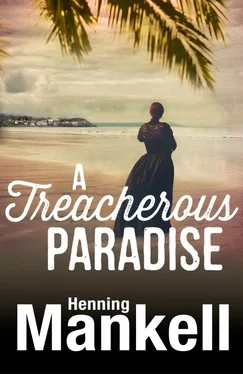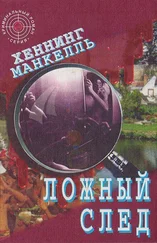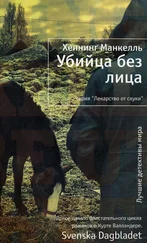Henning Mankell
A Treacherous Paradise
‘There are three kinds of people: those who are dead, those who are alive, and those who sail the seas.’
PLATO
Prologue
Africa Hotel, Beira, 2002
One day in the cold month of July, 2002, a man by the name of José Paulo opened up a hole in a rotten floor. He was not trying to make an escape route nor was he looking for a hiding place, but he intended to use the damaged parquet flooring as firewood since the cold of the African winter was harsher than it had been for many years.
José Paulo was unmarried, but he had taken over responsibility for his sister and her five children after his brother-in-law, Emilio, had suddenly disappeared one morning, leaving behind nothing but a pair of worn-out shoes and a number of unpaid bills. His debts were owed almost exclusively to Donna Samima, who ran an unlicensed bar close to the harbour where she served tontonto and home-brewed beer with an astonishingly high alcohol content.
Emilio used to spend his time drinking and talking about the time in the distant past when he had worked in the South African gold mines. But many people maintained that he had never set foot in South Africa, and had certainly never held down a steady job in his life.
His disappearance was neither something expected, nor something unexpected. He had simply slunk away during the silent hours just before dawn, when everybody was asleep.
Nobody knew where he had gone to. Nor would anybody miss him all that much, not even his own family. It is doubtful whether Donna Samima missed him, but she did insist that his bills should be paid.
Emilio, the talker and drinker, made virtually no impression on anybody even when he was in the vicinity. The fact that he had now disappeared made no real difference.
José Paulo lived with his sister’s family in the Africa Hotel in Beira. There had been a time, which now seemed both distant and incomprehensible, when this establishment had been considered one of the grandest hotels in colonial Africa. It was ranked as comparable with the Victoria Falls Hotel, on the border between Southern Rhodesia and Northern Rhodesia before those countries achieved independence and became known as Zimbabwe and Zambia.
White people came to the Africa Hotel from far and wide in order to get married, celebrate anniversaries, or simply demonstrate the fact that they belonged to an aristocracy that could never imagine that their colonial paradise would one day collapse. The hotel had been the venue for tea dances on Sunday afternoons, swing and tango competitions, and no end of people had been photographed standing outside its imposing entrance.
But the colonial dream of paradise was doomed. One day the Portuguese abandoned their last fortresses. The Africa Hotel started to crumble the moment the former owners had left. The deserted rooms and suites were occupied by poverty-stricken Africans. They deposited their few belongings in the carcasses of what used to be upright pianos and Steinway grands, in dilapidated boudoirs and bathtubs. The beautiful parquet floors were chopped up and used as firewood when winter was at its coldest.
Eventually there were several thousand people living in what had once been the Africa Hotel.
Anyway, one day in July, José Paulo made a hole in the floor and chopped up the parquet. It was freezing cold in the room. The only source of heat was an iron cauldron in which they cooked their food over an open fire. The smoke was channelled out through a smashed and badly repaired windowpane by means of an improvised chimney.
The half-rotten flooring had already begun to smell thanks to its neglect. José thought there must be a dead rat underneath it spreading the stench of decomposition. But when he investigated, all he could find was a little notebook with a calf-leather binding.
He managed to spell out a strange name written on the black cover.
Hanna Lundmark .
Underneath the name was a year: 1905 .
But he was unable to make head or tail of what was written inside it. It was in a language he didn’t recognize. He turned to old Afanastasio who lived further down the corridor, in room 212, and was regarded by all those packed inside the hotel as a wise man, because in his youth he had survived a confrontation with two hungry lions on a deserted road outside Chimoio.
But not even Afanastasio could read the text. He approached old Lucinda, who lived in what used to be reception, for assistance, but she didn’t know what language it was either.
Afanastasio suggested that José Paulo should throw the book away.
‘It’s been lying there under the floorboards for ages,’ said Afanastasio. ‘Somebody hid it there in the days when the likes of us were only allowed to enter this building in the role of waiters, cleaners or porters. No doubt this forgotten book tells an unpleasant story. Burn it. Use it as fuel when it gets really cold.’
José Paulo took the book back to his room. But he didn’t burn it, without quite knowing why. Instead he found a new hiding place for it. There was a cavity underneath the window ledge where he used to stash away any money he occasionally managed to earn. Now the few filthy banknotes could share the space with the black notebook.
He never took it out again. But he didn’t forget about it.
Part One
The Missionaries Leave the Ship
It is 1904. June. A scorching hot tropical dawn.
In this far distant here and now, a Swedish steamship lies motionless in the gentle swell. On board are thirty-one crew members, one of them a woman. Her name is Hanna Lundmark, née Renström, and she is working on board as a cook.
In all, thirty-two people were due to make the voyage to Australia with a cargo of Swedish heartwood, and planks for saloon floors and the living rooms of rich sheep farmers.
One of the crew has just died. He was a mate, and married to Hanna.
He was young, and keen to go on living. But despite being warned by Captain Svartman, he went ashore one day while they were topping up their supplies of coal in one of the desert harbours to the south of Suez. He was infected with one of the deadly fevers that are always a threat on the African coast.
When it dawned on him that he was going to die, he started howling in fear.
Neither of the men present at his deathbed — Captain Svartman and Halvorsen, the Ship’s Carpenter — could make out any last words that he uttered. He didn’t even say anything to Hanna, who was about to be widowed after a marriage lasting only one month. He died screaming and — eventually, just before the end — roaring in terror.
His name was Lars Johan Jakob Antonius Lundmark. Hanna is still mourning his death, having been devastated by what happened.
It is now dawn the day after his death. The ship is not moving. It has heaved to because there will shortly be a burial at sea. Captain Svartman does not want to delay matters. There is no ice on board to keep the corpse cold.
Hanna is standing aft with a slop pail in her hand. She is short in stature, high-breasted, with friendly eyes. Her hair is brown and gathered in a tight bun at the back of her head.
She is not beautiful. But in a strange way she radiates an aura suggesting that she is a totally genuine human being.
The here and now. She is here. On the sea, on board a steamship with two funnels. A cargo of timber, on its way to Australia. Home port: Sundsvall.
The ship is called Lovisa . She was built at the Finnboda shipyard in Stockholm. But her home port has always been on the northern Swedish coast.
She was first owned by a shipping company in Gävle, but it went bankrupt after a series of failed speculative deals. And she was then bought by a company based in Sundsvall. In Gävle she was called Matilda , after the shipowner’s wife, who played Chopin with clumsy fingers. Now she is called Lovisa , after the new owner’s youngest daughter.
Читать дальше












